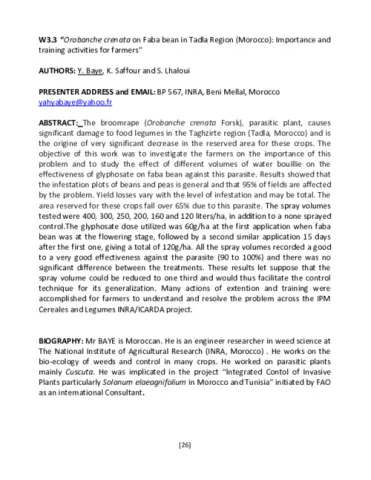Orobanche crenata on Faba bean in Tadla Region (Morocco): Importance and training activities for farmers

Abstract
The broomrape (Orobanche crenata Forsk), parasitic plant, causes
significant damage to food legumes in the Taghzirte region (Tadla, Morocco) and is
the origine of very significant decrease in the reserved area for these crops. The
objective of this work was to investigate the farmers on the importance of this
problem and to study the effect of different volumes of water bouillie on the
effectiveness of glyphosate on faba bean against this parasite. Results showed that
the infestation plots of beans and peas is general and that 95% of fields are affected
by the problem. Yield losses vary with the level of infestation and may be total. The
area reserved for these crops fall over 65% due to this parasite. The spray volumes
tested were 400, 300, 250, 200, 160 and 120 liters/ha, in addition to a none sprayed
control.The glyphosate dose utilized was 60g/ha at the first application when faba
bean was at the flowering stage, followed by a second similar application 15 days
after the first one, giving a total of 120g/ha. All the spray volumes recorded a good
to a very good effectiveness against the parasite (90 to 100%) and there was no
significant difference between the treatments. These results let suppose that the
spray volume could be reduced to one third and would thus facilitate the control
technique for its generalization. Many actions of extention and training were
accomplished for farmers to understand and resolve the problem across the IPM
Cereales and Legumes INRA/ICARDA project
